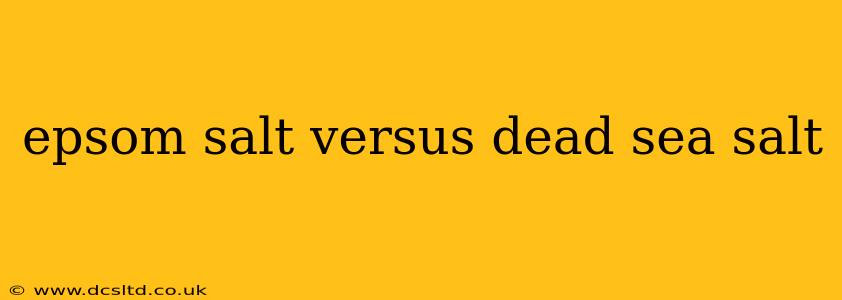Epsom salt and Dead Sea salt are both popular choices for bath soaks and other wellness applications, but they possess distinct compositions and benefits. Understanding their differences is crucial for choosing the right salt for your specific needs. This comprehensive guide will delve into the key distinctions between these two salts, addressing common questions and providing valuable insights for informed decision-making.
What is Epsom Salt?
Epsom salt, chemically known as magnesium sulfate (MgSO₄), is a naturally occurring mineral compound. Unlike Dead Sea salt, which is harvested from a specific location, Epsom salt can be found in various locations worldwide and is often produced commercially. Its distinctive properties stem from its high magnesium and sulfate content.
What is Dead Sea Salt?
Dead Sea salt is harvested from the Dead Sea, a hypersaline lake bordering Jordan and Israel. Its unique composition reflects the mineral-rich environment of the Dead Sea. It contains a complex blend of minerals, including magnesium, potassium, calcium, and bromide, in significantly higher concentrations than typical sea salt or Epsom salt. This mineral-rich profile contributes to its distinct therapeutic properties.
What are the Key Differences Between Epsom Salt and Dead Sea Salt?
The primary difference lies in their chemical composition. Epsom salt is predominantly magnesium sulfate, while Dead Sea salt is a complex mixture of various minerals. This difference directly impacts their respective benefits and applications.
Mineral Composition: A Detailed Comparison
| Mineral | Epsom Salt (Magnesium Sulfate) | Dead Sea Salt |
|---|---|---|
| Magnesium | High | High |
| Sulfate | High | Present, but lower concentration than Mg |
| Potassium | Trace | High |
| Calcium | Trace | High |
| Bromide | Trace | Significant |
| Other Minerals | Minimal | Variety of minerals in significant amounts |
What are the Benefits of Epsom Salt?
Epsom salt's primary benefits are linked to its magnesium and sulfate content. Magnesium is crucial for muscle function, nerve transmission, and blood sugar control. Sulfate aids in detoxification and may help reduce inflammation. Common uses include:
- Muscle relaxation: Soaking in Epsom salt can ease muscle aches and soreness.
- Stress relief: Magnesium's relaxing properties can contribute to stress reduction.
- Skin exfoliation: Gentle scrubbing with Epsom salt can help exfoliate dead skin cells.
What are the Benefits of Dead Sea Salt?
Dead Sea salt's benefits are attributed to its diverse mineral profile. The high concentration of minerals provides a broader spectrum of therapeutic effects. Common uses include:
- Skin conditions: Its minerals can help soothe various skin conditions like eczema and psoriasis.
- Anti-inflammatory effects: Multiple minerals contribute to reducing inflammation.
- Mineral replenishment: Soaking in Dead Sea salt can help replenish essential minerals lost through sweat or other means.
- Improved circulation: Some users report improved circulation after using Dead Sea salt.
Which Salt is Right for Me?
The choice between Epsom salt and Dead Sea salt depends on your individual needs and preferences.
-
Choose Epsom salt if: You primarily seek muscle relaxation, stress relief, and a simple, cost-effective bath soak.
-
Choose Dead Sea salt if: You're looking for a more comprehensive mineral bath with potential benefits for various skin conditions and overall well-being. Be mindful that it can be more expensive than Epsom salt.
Is Epsom Salt Good for Skin?
Yes, Epsom salt can be beneficial for skin. Its magnesium sulfate content can help soothe irritated skin and may help reduce inflammation. However, it's crucial to use it in moderation and avoid prolonged exposure to avoid potential dryness.
Is Dead Sea Salt Good for Acne?
Dead Sea salt's mineral-rich composition may help improve acne by reducing inflammation and balancing skin's natural oils. However, individual results may vary, and it's advisable to consult a dermatologist for severe acne.
Can You Mix Epsom Salt and Dead Sea Salt?
Yes, you can mix Epsom salt and Dead Sea salt for a bath soak. This combination can provide a blend of benefits from both salts. However, start with small amounts of each to gauge your tolerance and desired effects.
Conclusion
Both Epsom salt and Dead Sea salt offer unique benefits. Choosing the right salt depends on your specific needs and goals. Understanding their differences in composition and therapeutic properties allows for informed decision-making, enabling you to harness the full potential of these natural minerals for enhanced well-being.
